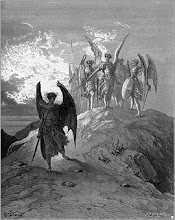your host: Welcome to Tough Talk.
Bible: Thnk y.
your host: Please, in English.
Bible: Verily.
your host: How 'bout we go colloquial, we don't want to confuse anyone.
Bible: Ah, so you're asking for clarity, my specialty don't worry yourself about it. I'll speak in the most simplistic language I can muster.
your host: It's interesting that you should say that. For a collection of writings dedicated to breaking the world down (especially moralistically) into simple conceptual categorizations of black and white, interpretations of your content have been, at best, varied, which points to a lack of clarity in my estimation, how do you respond to this?
Bible: People are peculiar creatures, they see and believe what they want to. These vagrant interpretations that you allude to can in some cases be attributed simply to prejudices of perhaps influential individuals throughout history, which views over time have been adopted into the wider culture of worship. The teachings found herein need not be confusing at all, you need to go about things with the right spirit so to speak. I can offer advice but I'll need to invoke the King James English?
your host: Go ahead...
Bible: In 2 Peter 1:20-21 I say: "Knowing this first, that no prophecy of the scripture is of any private interpretation. For the prophecy came not in old time by the will of man: but holy men of God spake as they were moved by the Holy Ghost." or, and this one I'm particularly fond of, from 2 Timothy 3:16 " All scripture is given by inspiration of God, and is profitable for doctrine, for reproof, for correction, for instruction in righteousness."
your host: I realize that your content, for believers, are all direct revelations from God, the Song of Solomon notwithstanding, but the thing that trips up many people is verifying whether or not that claim is true. There has to be some kind of test outside of the bible itself which can substantiate the quote unquote truth within it. Accepting the authority of the Bible strictly as a brute fact seems to go above and beyond the reasonable limits of faith into something new and well perhaps dangerous.
You touched on the Holy Ghost which I'm sure will have some bearing on the the whole process, but there's something else I'd like to focus on for the moment. I'm glad you brought up the manner of your transcription, because that leads us into another well documented controversy, namely the Documentary Hypothesis and the Synoptic Problem, did these (purported) holy men of God receive revelation directly from him, I'm talking about the Moseses and the Matthews, the Marks, and the Lukes; or is the Torah actually a compilation of unknown authors with enigmatic tags like J,E, D and H? Why are the first three gospels so similar?
Bible: Well Mr. Host, that's a very good many questions, I'll have to address the issue of the Holy Ghost which we're saving for later only because it impacts deeply on what we're discussing now. What we need to remember is that traditions are created by segments of society to introduce a semblance of order to chaos. As the philosophers say the natural state of humankind is "Nasty, brutish and short." It wasn't always that way, but over time things became unpleasant, which conditions were undesirable, so individuals and families banded together into clans which became tribes and so forth, practices were introduced to encourage unity and prosperity for the group. Traditions were passed on, some of them made it to the twenty first century (almost). In Christianity and Judaism one of these traditions is that Moses wrote the first five books of the old testament. Now for anyone interested in reading the bible it doesn't much matter who wrote what, from a historical perspective it's nice to know (and yes more than one author contributed to the Torah) but more important is what power or influence they wrote by. The Holy Ghost is not only the medium for receiving revelation, but for verifying it also. It takes time to learn to listen and understand its subtle language, but the only way to know what is true and what's not is to give it a try. Go on, it wont hurt.
your host: It all sounds very mystical, but I'll take that it into consideration. We'll be back after the break.
Oh Say, What Is [True]
5 days ago





